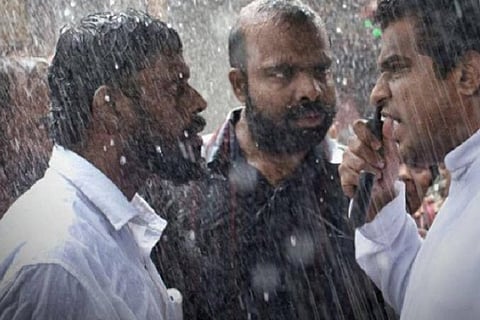

The Malayalam film industry has produced yet another film that's charmed audiences beyond the state. Lijo Jose Pellissery's Ee.Ma.Yau, a tragicomedy about a son's desire to give his father a grand funeral, has won critical acclaim, and is also doing well at the box-office.
Set in Chellanam, a fishing village, the story is about Vavachan and how his death unleashes a series of events. Vavachan is no VIP. He's a drunkard who cheats on his wife and lives in a tiny house. But, to his family, he is important. Especially to his son, Eeshi (Chemban Vinod Jose), who promises his father on that fateful day that he will ensure that the latter is given a memorable send-off – from band to bishop. Vavachan dies a rather unglamorous death – he suffers a cardiac arrest, but not before he slips and falls (thanks to the arrack he's addicted to), hurting his head slightly.
What follows is a delightful black comedy about how the entire village responds to the death. The gossip network is so authentically etched that you feel like an eyewitness to the events. Take for example, the way someone enquires who made the duck curry, even as they're all seated as mourners. Or the little 'mala' transaction between Vavachan's daughter-in-law and Karutha Molly. Or the way the priest-detective (inspired by GK Chesterton's Father Brown?) casually bends to take a look at the head injury of the corpse.
The film is entirely set in Chellanam. In fact, most of it is set within the confines of Eeshi's home and front yard. There are no big stars who are part of the cast. Chemban Vinod Jose, Vinayakan, and Dileesh Pothan are the most recognisable names in the film.
Unlike other south Indian industries and Bollywood where most films are set in urban areas and revolve around characters who are city-bred, Malayalam cinema continues to set its stories in small towns and villages. Even if the characters may visit cities, they spend a good part of their time in non-metros – as in Eeda or Kammatipaadam. Urban films like Bangalore Days, Mayaanadhi, Njandukalude Naattil Oridavela, Hey Jude or films that are set outside the country like Take Off, do hit the screens once in a while, but a vast majority are about characters who live ordinary lives in small worlds.
The conflicts in the plot, too, tend to be small-scale and more involved with human nature than external factors. Take Sudani from Nigeria, for example. The film is about an African soccer player who comes to Malappuram to play in a tournament. But most of the film is set in manager Majeed's (Soubin Shahir) house, because the player, Samuel (Samuel Abiola Robinson), injures his leg and is bedridden. The film explores the complex relationships in Majeed's home – between a hurt son and his caring mother, between a wife and her sensitive second husband, and a resentful stepson and a respectful stepfather.
The film could have been set on a much larger canvas but director Zachariah, by keeping it small, gives us an intimate understanding of the characters involved. There is no need to show more when you can achieve what you want with less.
Dileesh Pothan's two highly acclaimed films, Maheshinte Prathikaram and Thondimuthalum Driksakshiyum, are also set in small towns and revolve around small problems. Although both films are very culturally rooted – the first in Idukki and the second in Kasargod – they held appeal for audiences across the country. The characters were written so well that it didn't matter if the enamoured audience had never set foot in Kerala, let alone these towns.
While films set in rural areas were popular in other industries, the trend slowly shifted to urban areas with changing times. 'Rural' films, if at all they get made, are more likely to be about caste violence (several Tamil films on the subject, like Paruthiveeran, Uriyadi and so on, are set in rural areas) or political vengeance (like a Rangasthalam for example) than explore ordinary lives where nothing greatly dramatic takes place. Films like Oru Kidayin Karunai Manu, for instance, are pretty rare and their reach is quite limited - they seldom release outside the state or the southern region.
Perhaps it's because the rural-urban divide in Kerala is not as stark as it is in other states. Perhaps it's because Malayalam cinema is more story-driven than star-driven. Perhaps it's because the budgets are much smaller than what it is in the bigger industries. Perhaps it's a combination of these factors – but whatever it is, the Malayalam industry continues to look towards its small towns and villages for inspiration.
In a rapidly shrinking world, the local flavours of its cinema are winning fans among multiplex audiences in other states. Unlike other industries, which are trying to make big budget, pan-Indian films in a bid to grab more eyeballs, Malayalam cinema is managing to do that by simply sticking to its true self.
Also read: 'Rangasthalam' becomes a big hit in the US